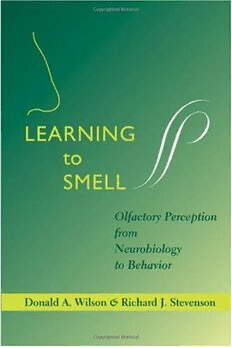
Learning to Smell: Olfactory Perception from Neurobiology to Behavior PDF
322 Pages·2006·1.925 MB·English
Most books are stored in the elastic cloud where traffic is expensive. For this reason, we have a limit on daily download.
Preview Learning to Smell: Olfactory Perception from Neurobiology to Behavior
Description:
Written by a neurobiologist and a psychologist, this volume presents a new theory of olfactory perception. Drawing on research in neuroscience, physiology, and ethology, Donald A. Wilson and Richard J. Stevenson address the fundamental question of how we navigate through a world of chemical encounters and provide a compelling alternative to the "reception-centric" view of olfaction. The major research challenge in olfaction is determining how the brain discriminates one smell from another. Here, the authors hold that olfaction is generally not a simple physiochemical process, but rather a plastic process that is strongly tied to memory. They find the traditional approach -- which involves identifying how particular features of a chemical stimulus are represented in the olfactory system -- to be at odds with historical data and with a growing body of neurobiological and psychological evidence that places primary emphasis on synthetic processing and experiential factors. Wilson and Stevenson propose that experience and cortical plasticity not only are important for traditional associative olfactory memory but also play a critical, defining role in odor perception and that current views are insufficient to account for current and past data. The book includes a broad comparative overview of the structure and function of olfactory systems, an exploration into the mechanisms of odor detection and olfactory perception, and a discussion of the implications of the authors' theory. Learning to Smell will serve as an important reference for workers within the field of chemical senses and those interested in sensory processing and perception. (July 2006)
See more
The list of books you might like
Most books are stored in the elastic cloud where traffic is expensive. For this reason, we have a limit on daily download.
